Preparing you for industry
Embarking on a ScreenSkills Select-endorsed college or university course gives you confidence that you will receive excellent preparation for entering the screen industries.
All ScreenSkills Select courses are independently assessed by our team of highly-regarded industry evaluators, who use rigorous criteria and provide annual feedback to help further strengthen links and relevance to the industry. We make sure that courses are addressing the main priorities for screen employers, making it easier for you to get the job you want after finishing your studies.
Studying on a ScreenSkills Select-endorsed course means it has:
- great industry relevant course content
- firm links to local and national employers in the screen industries
- proven to best prepare you for a career in screen
Having ScreenSkills Select endorsement is extremely important in recognising the quality of our teaching and our commitment to our students and alumni.
Exclusive benefits
Industry insight sessions
We provide both live and recorded industry insight interviews for ScreenSkills Select students and course leaders to engage and network with industry professionals. These popular sessions present a deeper insight into a variety of in-demand screen industry job roles, such as in film and TV production/post-production, VFX, animation, games, location management, and set design/production.
Library of Select sessions
We have a library of pre-recorded online Select Sessions delivered by industry experts. These are exclusive employability webinars to help students build their confidence and knowledge of entry level roles; how to approach job applications and interviews; the world of freelance working and find out about the entry level training schemes available.
ScreenSkills e-learning modules
ScreenSkills offers over 30 free e-learning modules that are relevant for students as well as industry professionals, including two key series to help students better understand and progress into the screen industries. We encourage students on all Select endorsed courses to take our modules and help course leaders track completion so they can support you better in your learning.
UK BAFTA Scholarships
Students on ScreenSkills Select university postgraduate courses (and undergraduate courses in games) are eligible to apply for a UK BAFTA scholarship for up to £12,000 towards course fees. Find out more on the BAFTA website.
BAFTA UK scholar and post production student Jess Morris
Jess has always been creative and from an early age was writing scripts and short stories from her Pontypridd home. Looking back, she said: “I was encouraged by my mother to pursue a career in film and TV after she read my writing. This is why I then went to the University of South Wales in Cardiff to study screenwriting after I left school.”
After graduation and working for the NHS locally, Jess decided that her heart remained in film and TV. She reflected that: “I knew in my heart of hearts where my future lay and I had really enjoyed what I had already learnt about post production and editing so I decided that I wanted to study a master’s degree. I looked at courses across the country and whittled it down to two. I ultimately chose the MA Post Production in Film and Television at Solent University. This was because it was both ScreenSkills Select endorsed which meant I knew it would a high quality course and there was also the opportunity to apply to the BAFTA UK Scholarship Programme for support. This was an extra incentive because it would make it affordable.”
Furthermore, Jess says: “I saw the equipment and facilities at Solent were first class and up-to-date and the lecturers and technicians came across as being really supportive which also helped to make my final decision. Since starting the course, this support has continued and I certainly have made the right choice. Southampton is also a really welcoming city for students. It is smaller than Cardiff where I studied before and whilst I still have many friends back where I am from, nowadays with trains and phones keeping in contact is really easy.”
With respect to the BAFTA UK Scholarship Programme, Jess states that “it has been a huge help. It has covered my course fees, accommodation and living costs. I still work part-time in JD Sports but it means the huge financial pressure I had when studying for my initial degree is not there. Frankly, I could not afford to study on this course if it was not for the BAFTA UK Scholarship Programme.”
Given that applications exceed the available funding, Jess’ tips on how to successfully complete the form revolve around “firstly, take your time and do not rush it. Sit down, map out what you want to say and your key points – which is what I learnt from my screenwriting degree. Then keep adding to it, revisiting it and get friends and family to also review it. Not just for things like ‘typos’ but also whether you are making the best case you can and are fully promoting yourself. I found writing my personal statement when applying for my first degree hard as it just felt weird but you have to see past that and those close to you can really help. They all want you to do well.”
Jess’ course finishes in late summer and she is starting to look at her career encouraged by the quality of what she is learning at Solent and also, and as part of the course, the discussions she has with the industry experts that regularly come to the university and talk to the students. A key ingredient of being a ScreenSkills Select endorsed course.
Jess is an avid horror film fan and had already watched Scream VI three times in less than a month since it was recently released. Asked about her future after Solent, she said: “Long term, I really want to use my editing skills and experience to work on TV and film trailers. The ultimate goal would be to work on horror film trailers, they set the films up perfectly and never disappoint. I know I need to get lots of industry experience beforehand and that will be my priority for the years ahead.”
Wise words and sentiments from Jess, who clearly has a bright future supported by her excellent course and also because of the backing from the BAFTA UK Scholarship Programme, the value of which should not be under-estimated.
ScreenSkills Select newsletter
We will let your course know about further ScreenSkills initiatives, events and training opportunities that could help you prepare to work in the Screen industries via our Select newsletter. Opportunities such as ScreenSkills Trainee Finder scheme where alumni from ScreenSkills Select university and college courses are encouraged to apply for Trainee Finder, the year-long industry-funded scheme that places trainees into paid placements on productions that contribute to the ScreenSkills skills funds.
Testimonials from endorsed course students
Junior character artist Chloe Smith
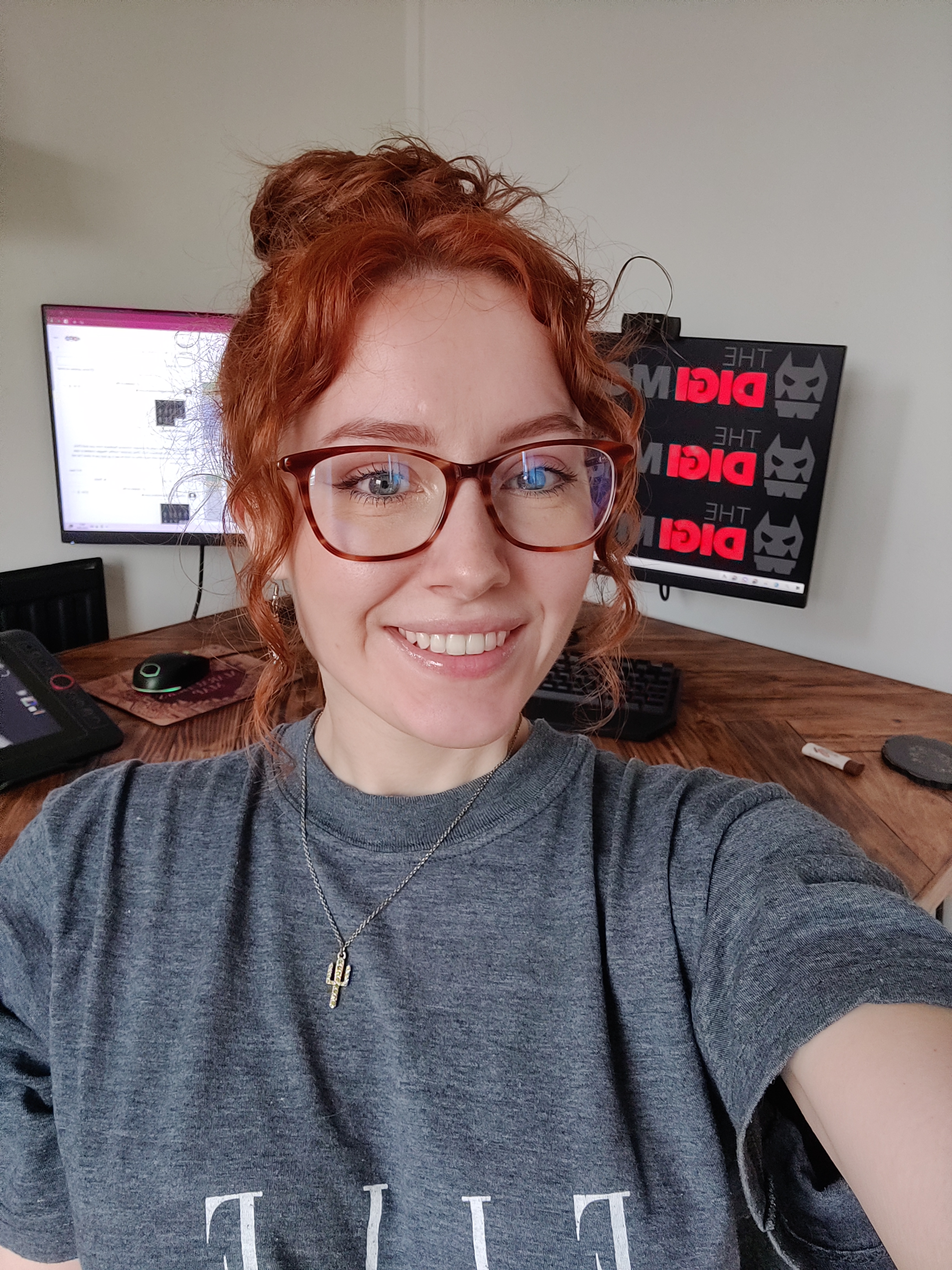
Chloe Smith went for a tour around Warwickshire College University Centre (WCUC) in Leamington Spa and once she saw the equipment available and had all her questions answered: “I knew straight away that this was the right course for me as it encompassed everything I wanted to learn.”
Since graduating with first class honours in Games Art, she is now a junior character artist for Digi Monsters, a small outsourcing studio who design, create and deliver work for games studios, visual effects, film and more. The first game she worked on was Crayta, creating characters and various outfits, concept work, sculpting, skinning, rigging and texturing.
Chloe Smith went for a tour around Warwickshire College University Centre (WCUC) in Leamington Spa and once she saw all of the equipment available and had all her questions answered “I knew straight away that this was the right course for me as it encompassed everything I wanted to learn.”
Since graduating with first class honours in Games Art, she is now a junior character artist for Digi Monsters, a small outsourcing studio in Leamington Spa who design, create and deliver work for games studios, VFX, film and more. Her first game she worked on was Crayta creating characters and various outfits, concept work, sculpting, skinning, rigging and texturing.
Chloe reflects on the fact that she did not follow the traditional route of school, sixth form/college then university. However after working for a number of years in different non-creative jobs she realised that while she enjoyed them “they weren’t giving me the sort of fulfilment I’d need to make a long term career. As time went on I realised I should be doing something more creative for a job. I’d always been interested in animation films and character storytelling so I started to research 3D modelling, character art and animation courses.”
WCUC’s Games Art course stood out to Chloe against other courses for a number of reasons. Its brilliant reputation, it is in central Leamington Spa where countless games studios are located and it has a huge list of industry contacts. Additionally, the smaller classes appealed to her because she knew she would get more tailored learning and support rather than being in a large group at a university. Chloe also said that whilst she knew the course had a “really great reputation, once I found out it was endorsed by ScreenSkills Select it gave me the security and confidence that I was making the right choice.”
Looking back, she reflected that “we had frequent demonstrations/tutorials in class and also a whole library of online tutorials at our fingertips. There were industry speakers who gave presentations, industry briefs, regular critiques and attended games events/exhibitions. There is also a student run game studio (Studio 694) where students collaborate to create their own games and participate in game jams. The course was packed full of experiences and opportunities.”
Chloe also reflected on how it got her industry-ready as the “course helped me understand the workflow that is generally used in the industry and the necessary steps that are taken to produce the best, most thought-out pieces of work. It also helped me to get comfortable with having my work critiqued regularly which wasn’t something I was used to in the jobs I had before I started my degree. It helps build resilience and determination to keep going until your work is of the best standard it can be.”
When Chloe started to think about her career she applied for all the junior/graduate character artist, 3D generalist roles she could find online – making tailored CVs and cover letters for every application. She also researched other local studios that didn’t have any vacancies advertised and “politely sent them my CV, cover letter and portfolio asking if they might have any positions I could apply for in the future and also feedback on my portfolio.”
“I also kept a record of what I applied for, any declines, interview invitations and outcomes. I did have a few rejections, some applications never replied, but after a while I received two interview invitations, got second interviews for both and then got offered both of the jobs. One of the successful interviews came from the company I emailed with my details who did not have any jobs listed on their website, so it really was by chance that I asked them.”
Her top tips for students thinking about what course to study next is “make sure you’re looking for a course you genuinely want to do, don’t just follow what your friends are doing. Go to as many open days and related events as possible to see what piques your interest.”
And for those currently on her old course, which of course would apply to any student on any course is: “Always create things you enjoy doing and are passionate about, but make sure to think about how the piece will look in your portfolio, what skills you are showing to prospective employers, whether it’s relevant to anything they work on. Also value your originality, try not to create things that have already been done ten times over by other people.”
So what’s next for Chloe?
“I am still very junior in my career so my short term goals are to continue learning and improving my skill set and generally gathering as much knowledge as I can. When I have more experience behind me and become a more senior artist, I would like to work on bigger projects. I’d love to work on an animated film as a character artist. I’ve recently started working in association with Women In Games and would like to continue being an ambassador for them too as the industry grows.”
Chloe is a real inspiration for any woman wanting a career in Games. She is also a perfect example to anyone who left school, went straight into work rather than university and is wondering if they made the right decision. Her success shows you can still rethink your decision, enjoy your studies and start a whole new successful career.
Environment artist Litha Bacchi
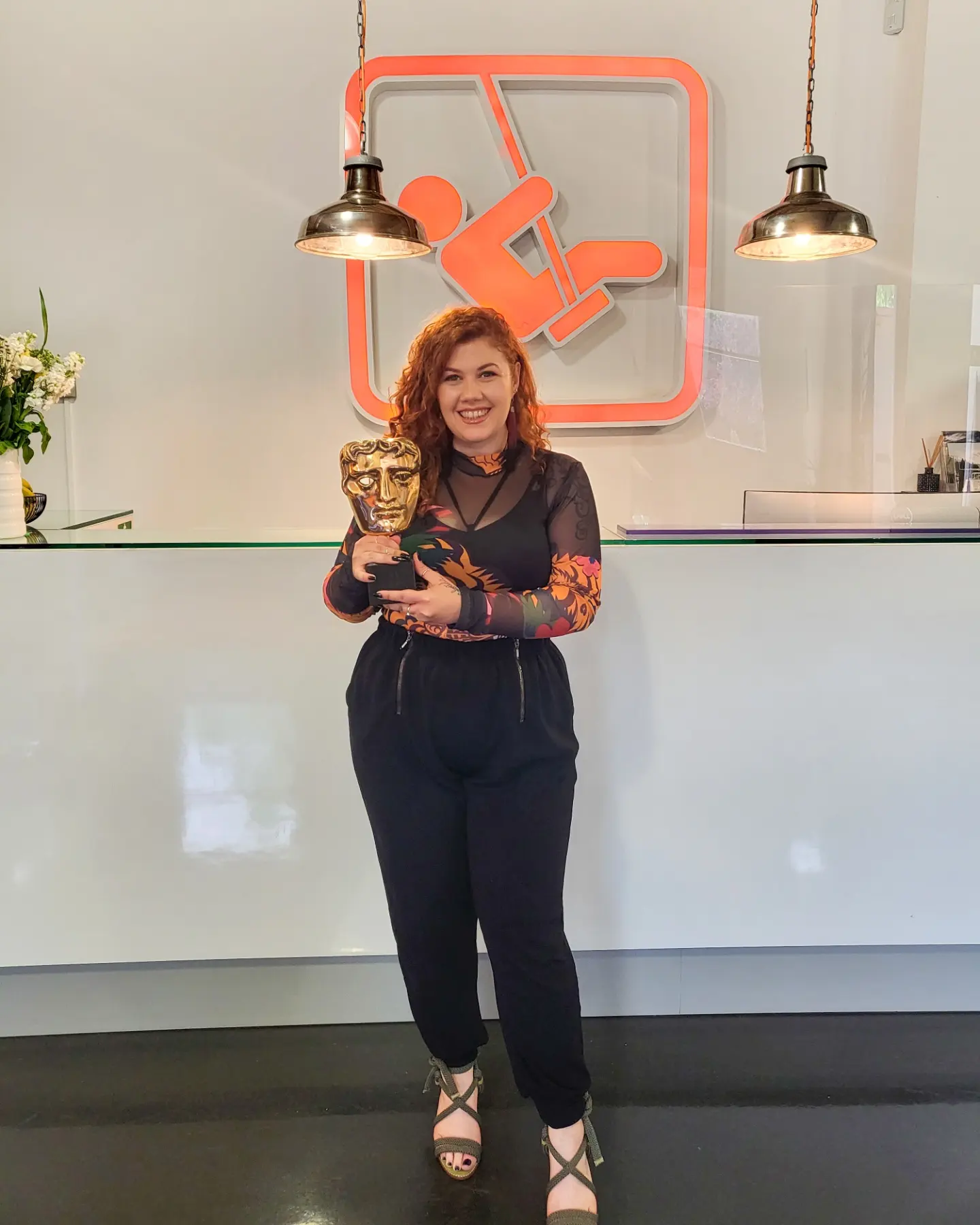
Litha is an environment artist at Playground games and recently graduated with a games art degree from De Montfort University.
Litha fully recognises the great opportunities that Playground Games have given her and who can blame her, as after all, she is working for the winners of the 2022 BAFTA Games Awards (British Games category) for Forza Horizon 5 - a title that Litha proudly helped to create!
Litha, who has Brazilian and Italian dual citizenship, has clear views for students today looking to take those first steps towards a games career - “get a great portfolio, listen to advice from tutors and make links with industry people especially those who used to study on your course!”.
Before joining Bafta-winning Triple A-rated XBox Games Studio, Playground Games, the creators of the Forza Horizon series, Litha had a far different journey than most that join the industry. When she was growing up in Brazil, she got the gaming bug from her older brother and when she was a teenager she realised there was no real opportunity to be a gaming artist in her home country because there was little industry to enter. Looking for wider opportunities in life, she came to London, originally to pursue a singing career, but because there was so much competition at the time, she decided to pursue her other creative dream of working in games art.
She explained: “I started thinking of becoming a graphic designer but then through my research I realised that there were actual educational opportunities in games art in the UK. I also knew I had no time to lose as I was in my mid-twenties by then and if I was going to go into education, I wanted to make sure my studies would directly lead to a career.
“So I researched the courses, went to open days, looked at the ScreenSkills Select website to ensure they were credible - and the choice became clear I should study Games Art at De Montfort University. It had great course content where you had options to specialise in your final year and a real culture of collaboration between tutors and students. I was also sold on the close relationships it has with industry including its alumni who always come back and give talks.“
There were clear benefits with the alumni as “they are keen to recruit good people directly from the university so in my mind it was a course you got hired from. I also wanted to specialise and felt that some gaming courses are too generalist so you learn about game art, game development and game design, but the risk is you learn nothing with depth. Rarely will you actually use all three disciplines yourself professionally if you are working on a game. It is important to understand those other roles but I felt I did not want to take a ‘jack of all trades’, I wanted to specialise.”
Research is absolutely vital. Litha believes that in picking the right course, as well as making sure the course has industry standard hardware and software, it is not just about the direct studying. At De Montfort, she explained that “there is a games development society and game jams where students from other fields also got involved, such as computer programmers.”
This, and the course itself, really acted as a springboard to Litha in landing her job with Playground Games as she decided to partner with a fellow student in her final year on a project which then helped with her interview as she could demonstrate her team working ability. She gained a First Class degree which will have helped too of course!
In giving advice to those studying on her former course, including those she regularly goes back to speak to, she feels that being nice to people really counts because people will remember you including your fellow students and tutors. She says: “It is also important that when people give talks, talk to them and make most of people who are around you. Build relationships. The games industry is small and if others set up a studio then they will already know you, it gives you a head start.”
Litha fully recognises the great opportunities that Playground Games have given her and who can blame her, as after all, she is working for the winners of the 2022 BAFTA Games Awards (British Games category) for Forza Horizon 5 - a title that Litha proudly helped to create!
Researcher, Camera Assistant & Shooting Researcher, Nella Gocal-McConkey
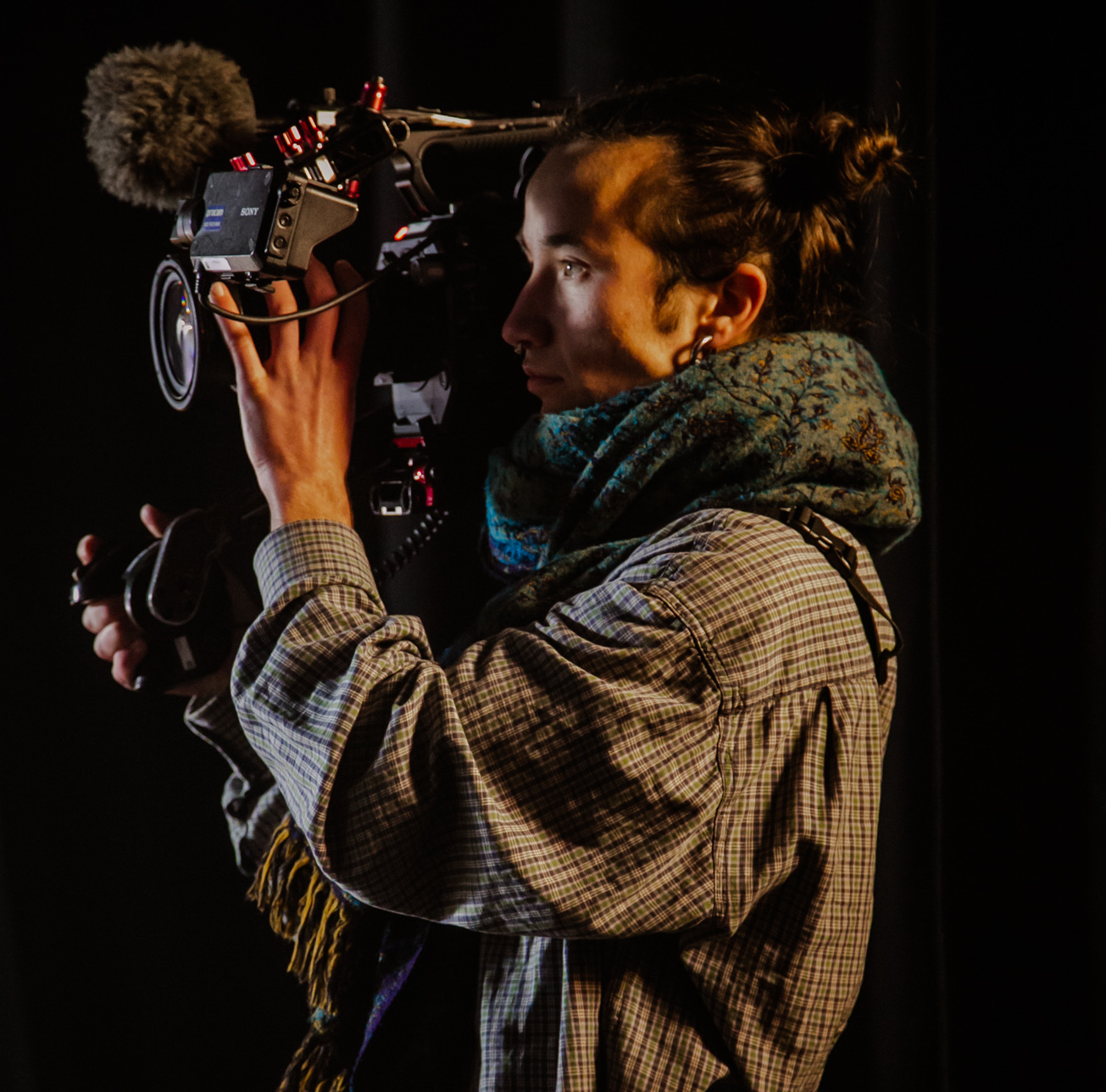
Nella is a researcher, camera assistant and shooting researcher working in factual TV for the BBC, Paramount+, ITV and PBS. He is a recent film degree graduate from Falmouth University. “I loved the location. It was very different to studying in a city and as I initially grew up in South East London and then moved to a Sussex village, I was looking for the latter environment. It was also very inclusive, diverse and LGBTQ+ friendly which was really important to me too.”
As a teenager who was already making videos, had a YouTube channel and loved photography, Nella Gocal-McConkey was already clear he wanted to study film at university before embarking on a career in the industry. For the now researcher, camera assistant and shooting researcher working in factual TV for the BBC, Paramount+, ITV and PBS, it was always a matter of finding “a course with the right balance of theory and practice which is what I wanted.”
The other important factors for choosing Falmouth University’s Film degree were: “I loved the location. It was very different to studying in a city and as I initially grew up in South East London and then moved to a Sussex village, I was looking for the latter environment. It was also very inclusive, diverse and LGBTQ+ friendly which was really important to me too.”
Nella said further: “The lecturers were also clearly passionate about the course they were teaching and this came through on the Open Day. The fact that it was also endorsed by ScreenSkills Select as opposed to other courses I was interested in, also helped to make my decision, which was the right one for me.”
During the course, Nella explained that due to the pandemic there were effectively two versions, a pre and during lockdown version, however both worked really well. Nella explained: “Before the pandemic there were lots of industry masterclasses and evening sessions which enabled you to meet key industry figures including BAFTA winners. During the pandemic, there was real concerted effort to keep students engaged with Neil Fox, Associate Professor of Film Practice and Pedagogy, producing brilliant mini podcasts with the industry’s best talent. This was a sure sign of the level of commitment from the teaching staff as well as the depth of their contacts and networks.”
Looking back, Nella is very clear about the importance of being proactive in your studies, getting involved in student union life as that enhances your CV and also keep looking for ways to get a foothold in the industry.
“On the course, I really pushed myself to learn the theory but also the practice with respect to cameras. I remember seeing these huge cameras for the first time, and having been really into still photography, I thought I could never operate one of these! However the training and support I received, gave me just enough knowledge to jump at the opportunity to become a camera trainee on Queen of the Universe.
“I have also found that to be the case in the industry itself where there is a lot of support and camaraderie. The experienced camera operators almost act as ‘dads’ to the younger camera operators from all backgrounds and they are teaching us everything.”
On finding roles, Nella advises students to use the opportunities that their course provides and to get to know, and keep a contact list of everyone, they meet in the industry. It is also important to figure out what role you want, and be very persistent in getting a foot in the door as once you are through it, further opportunities emerge.
Nella makes this really clear with respect to “the first programme I worked on was Queens of the Universe as a logger, camera trainee and talent/contestant runner.
This has also then opened up other opportunities so I worked for six months recently on BBC’s Springwatch which was brilliant especially as I want to eventually work in factual, documentaries and current affairs.”
“On real sets, I am on backing up the footage, changing lenses, cards, batteries as well as holding/lifting cameras and operating them myself. It is a very physically demanding job and is one I love.”
Summing up his time studying at Falmouth, Nella says: “I made the right decision to follow my passion for film and TV, picking the right course, studying hard and then really being focussed in getting in the industry. It also shows how welcoming the industry is. As long you are committed and a team-player then there is no reason why anyone cannot succeed.”
Nella can be contacted via his website or talent manager profiles.
Lighting technician / lighting console technician Niah Davies

Niah who recently graduated from Falmouth University with a degree in film and is currently a lighting technician / lighting console technician on BBC's Casualty.
"Work with the sound and lighting technicians. They will show you in detail how the kit works, how to get the best shots and will critique your work in a constructive way. They will go through what you have done and then how to make it better. The camera technicians at Falmouth are brilliant. It means your work will be really good before it gets to the lecturers."
After graduating from Falmouth University and now having spent over a year working as a lighting technician /lighting console technician on BBC's Casualty, Niah Davies reflected on how important it was for her to "learn and study the whole production process from start to finish as this has helped me to be more rounded and has benefitted my career and my work on Casualty. No matter how set you are on working in a certain role or department, pick a course that allows you to do rotations. It helps you understand all of the roles on set."
Niah from Cambridge knew at school that she wanted to work in the creative arts. Rather than be persuaded to work in a technology field like her peers who also lived in ‘Silicon Fen’ and with supportive teachers, she produced her own short film and showreel. This helped her to be accepted on the Film degree course at Falmouth, where she "felt at home, the place I was supposed to be.”
There were a number of other reasons why she chose Falmouth. She was really impressed by the high quality of the film, TV, animation and VFX that students already there had produced. These featured on their show reel. Nearly all of the lecturers were also still all working in the industry so they were current and still had real passion for their work and teaching. In addition, the fact that it was accredited, had a good international reputation and was also endorsed by ScreenSkills Select gave her confidence in the quality of the course. She is very clear that "I needed to be confident that it was a good course. I did not want to waste my one opportunity to learn and get into a career. So knowing it was endorsed by ScreenSkills Select gave me the encouragement to apply."
During her time there, she was “fully immersed in the theory and analysis of filmmaking as well as the practice. It meant that I learned so much and had a real grounding. This, alongside having easy access to kit, meant all of us on the course were confident enough to be able to make films left, right and centre."
She also felt that a real benefit, and one that she feels will benefits all students, is to work with the technicians as well as the right lecturers. She says: "Work with the sound and lighting technicians. They will show you in detail how the kit works, how to get the best shots and will critique your work in a constructive way. They will go through what you have done and then how to make it better. The camera technicians at Falmouth are brilliant. It means your work will be really good before it gets to the lecturers."
On what lessons she learned that she is happy to pass to currents students, she was clear that “working incessantly, join a creative agency that are always looking for students to help on productions and of course, network. And when you have a role, look and learn from the experts. I had a job working in London and connected with the first class gaffer. I was watching how he was working, his lighting and his effects. I learned so much working with him and also from other productions where the I picked up the importance of knowing how to behave on set, the etiquette and the need for pace. It really helped with my BBC interview.”
After that job she saw a role for a spark trainee posted on the BBC website "I had been scouring all of the websites and had been looking for this type of job for months. It is vital to keep applying and be on all the right websites as there are opportunities. I really pushed through my final year and was determined that I was going to work in the industry and make it happen. I really did not want to go back to ‘Silicon Fen’ and start a career making drones.”
Encouraging and wise words from Niah on what to think about before applying for the course that will give you the best education, why creating your own opportunities is crucial and understanding how to maximise your chances of landing your first job after graduating. Niah is the only women working on lighting on BBC Casualty which shows there are no barriers to success with the right skill and attitude.
Foley assistant Tom Holmes

Tom recently graduated from West Herts College with a Level 3 Diploma/Extended Diploma in Creative Media Production: Film and TV and is currently a foley assistant at post-production house Molinare.
Tim told us: “The fact that the course had been independently assessed and endorsed by ScreenSkills Select really helped me to make my final decision to apply.”
Tom from Watford, now onto his second role after studying his Level 3 Diploma/Extended Diploma in Creative Media Production: Film and TV at West Herts College, relates how important it was for him to find out the career he wanted and then where to study was through information on the ScreenSkills website: “My media studies GCSE really piqued my interest in the world of film and TV, but it was only when I went onto the ScreenSkills website that I could see the full range of opportunities available.”
Rather than staying on at school and then going to university, Tom decided to study at his local college (West Herts), especially because they had an excellent reputation, which extended to his course which employers recognised and valued alongside the clear links to the booming screen industry. This is further enhanced by its proximity to the Warner Bros. Studios Leavesden. Another advantage of studying on this course was it gave him the ability to obtain a qualification equivalent to three A levels without studying three different subjects.
He said: “When attending the college’s open day it was clear that the quality teaching was very high with tutors that have experience and knowledge of working in the industry. Another clear benefit was that they had excellent facilities with well-equipped studio and access to industry standard equipment.”
Furthermore, Tom said: “The course really focused on being vocational; specifically on film and TV with an emphasis on improving competence in a range of skills such as editing and camera work. I also had access to masterclasses with Film and TV professionals, which you wouldn't get at school. Practical and creative, 100% coursework which was important to me as I don't perform well in written exams.”
“The fact that the course had been independently assessed and endorsed by ScreenSkills Select really helped me to make my final decision to apply. At the college we are using everything on the ScreenSkills website, which shows the value of what the organisation does.”
An additional point that Tom relates to about the strength of the course is the fact that there is a real drive in getting students work experience and support in finding work. This included the college providing extra-curricular activities designed to enhance CV and help individuals stand out from the crowd.
Tom explained that “there was a clear focus on supporting students like me in getting the CV right, finding work experience and honing interview techniques. The latter was important to me as I felt I had never quite got them right, but with the preparation I received, I became confident in pitching myself. I would recommend to any student anywhere that they should take advantage of any of this type of support.”
“The course was really flexible too as it allowed me to undertake part time work too so whilst I was studying I was also working at a small film company, RSA films, working on adverts, this gave me welcome additional experience. The flexibility also allowed me to do two courses with the BFI Film Academy specialising in sound.”
After leaving the college with his qualification and an in-depth knowledge of the whole production process from pre through to post, he found a role as a runner then a foley assistant post-production house Molinare where he is working on a wide range of projects
He recounts his time at West Herts as being invaluable to broadening his knowledge and opening his eyes to the wide range of entry-level opportunities there are in the film and TV industry. In addition, the wide range of media too. He said: “When you think of TV and film, it is easy to forget the full range of different media there are, including adverts, social media digital video content and even music videos. The opportunities are endless and given how successful our industry is, the only thing holding you back is what you want to achieve.” Inspiring words from Tom, who clearly has a bright career ahead of him.
Junior production coordinator Crystal Leaity
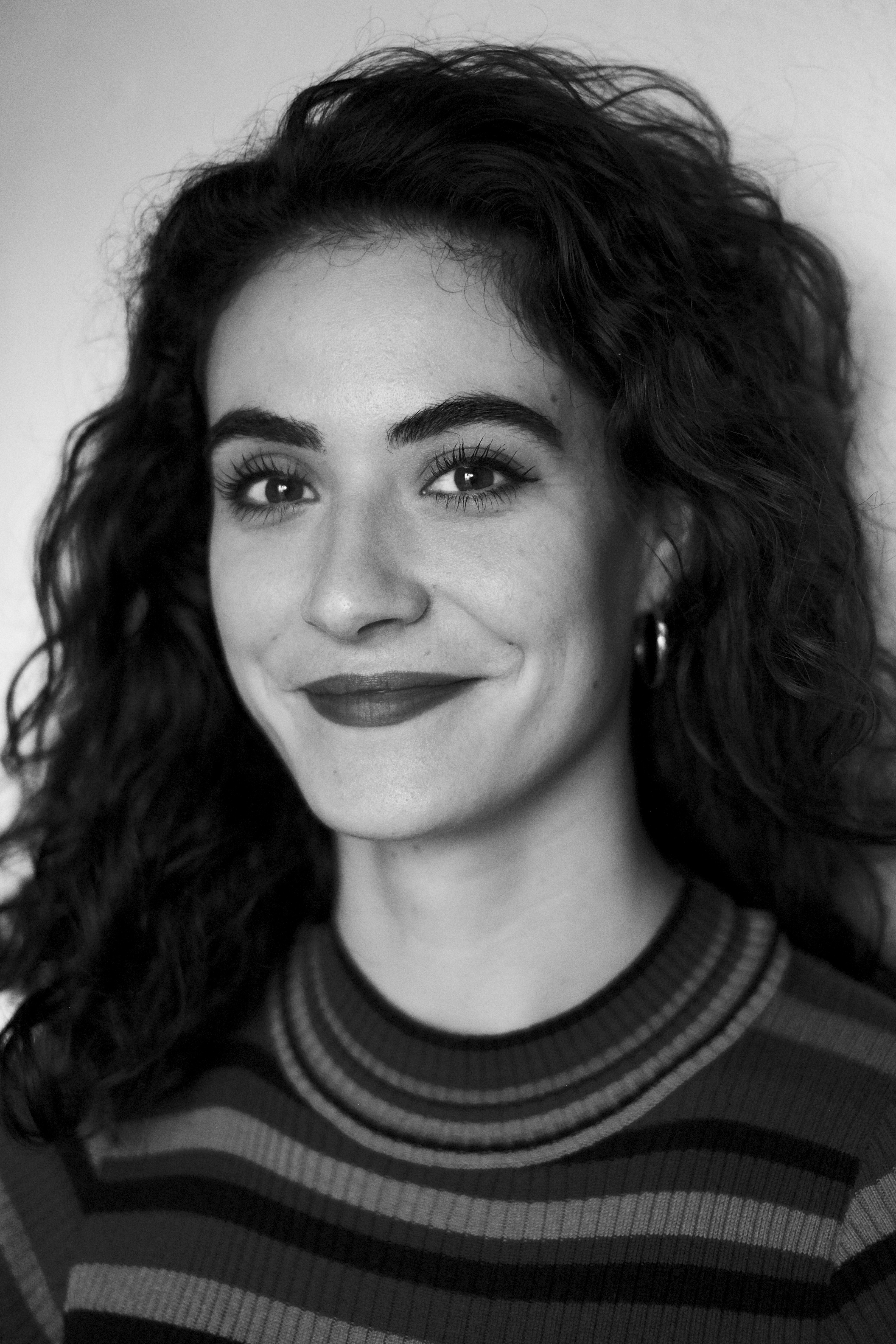
Crystal is from an acting background and studied directing at Screen and Film School, Brighton and currently is a junior production coordinator including on BBC Three’s Meet the Khans, Charlotte in Sunderland and BBC One’s Extraordinary Portraits.
Crystal said: “ScreenSkills are a wonderful organisation with a great reputation. Knowing that they endorsed the Screen and Film School course definitely gave me confidence when applying.”
Crystal is from an acting background and studied directing at Screen and Film School, Brighton and was clear that “it has given me a platform to work with some incredible, exciting new talent and to tell underrepresented stories that resonate with me and hopefully others.”
Looking back at the value of the course and why it was so good, it was because “the lecturers are so supportive and try to persuade you to work outside of your comfort zone. There are also some brilliant master classes with industry professionals and after school workshops run by alumni and current Screen and Film school staff.”
She also was clear that “my studies have given me confidence to pursue a career in production. This is something I never thought I was able to do. Fortunately I now have the skills thanks to my lecturers’ support and guidance.”
Brighton was a particularly important location to study too for Crystal as she reflected that “I have always been drawn to filming on celluloid film and expanding the film world outside of London. I moved from London to Brighton to get a new perspective.”
The ScreenSkills Select endorsement also helped in her decision-making “ScreenSkills are a wonderful organisation with a great reputation. Knowing that they endorsed the Screen and Film School course definitely gave me confidence when applying.”
Studying on courses with clear links with the screen industry is an important issue especially given how competitive entry-level roles can be. Even more so, if those links are with local production houses and companies. Crystal is currently working as a production coordinator for a Brighton-based TV company. Previously she had worked as a studio assistant for a corporate and branded content film company in Brighton. She found this opportunity on the Screen and Film School Facebook page.
Her current role as a junior production coordinator means she is coordinating TV productions including BBC Three’s Meet the Khans, Charlotte in Sunderland and BBC One’s Extraordinary Portraits. “On a day to day basis, this can be booking accommodation, applying for location licensing, liaising with talent and contributors to organise shooting schedules. I will also often help out with development research and forming ideas for new shows and recruiting new talent.”
In terms of any advice for students who are starting to look for the right course “go with what interests you and don’t worry about the level you are at now. We all started somewhere.”
For those already on the course she studied on, she believes it is vital “to respect and celebrate the work of your fellow students. Watch and read other people’s films and scripts and be open to healthy discussion and constructive criticism of your own work. You also have to be persistent if you want to get into the industry. I have worked in hospitality jobs, teaching and events for many years before landing a role as a runner on a HETV production.
Looking ahead, she would like one day to be a producer director on TV productions. She “enjoys working in a team of excited creatives bouncing off ideas and being part of some great stories. I also write and direct my own personal projects which I hope to pursue in the future as well as working full time job in production.”
The experience that Crystal has had in education and how that has given her confidence and the links to industry, shows the value of studying on high quality courses, especially those which are endorsed by Screen Skills Select .
You can follow Crystal’s career and view her portfolio through her website.
Edit assistant Jack Matthews
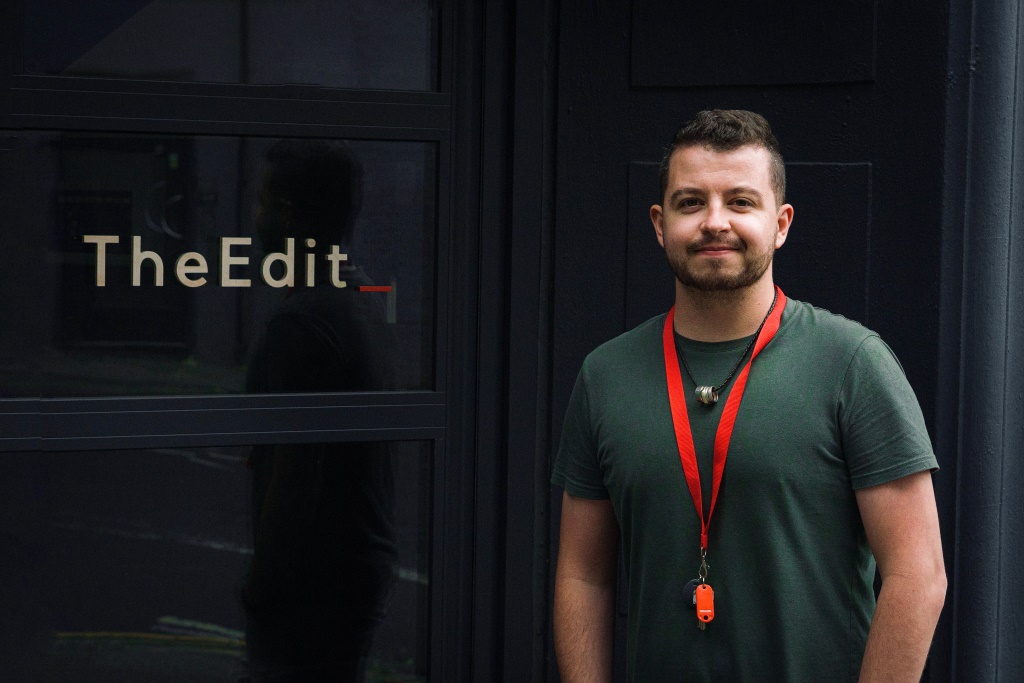
Jack studied filmmaking at Screen and Film School, Brighton and is now an edit assistant for post production house The Edit.
Jack has clearly benefited from studying on a high quality course with great teaching, access to equipment and links to industry.
Jack from Littlehampton in Sussex was clear as a teenager that he wanted a career in production. For him knowing that nearby was Screen and Film School, Brighton with its excellent facilities, great teaching and first class industry links was a clear advantage “I knew I did not have to study in Hollywood to get the education I needed.”
Following a film and media studies course at Chichester College which gave him solid theoretical grounding, he was keen to get his hands on equipment to start learning and mastering the practical craft of TV and film production. Hence he studied on the Filmmaking degree course at the Screen and Film School, Brighton which was endorsed by ScreenSkills Select during his time there.
Alongside the course and its location near to home, Jack also felt Brighton was an ideal place to study because of its growing number of production houses, many of whom relocating from London. This was in addition to the fact that Brighton is being seen more and more as an ideal film and TV location. Jack made the point that alongside being a very creative city, Roger Deakins, the Academy Award –winning cinematographer praises Brighton for the quality of its light which is great for filmmaking.
When asked to describe what was great about the studying at Screen and Film School, Brighton, he listed a number of reasons.
Firstly, it was “getting his hands-on” industry standard equipment which meant that he would have confidence in starting a career because he was trained to use real life equipment. He said this was a difference with some other colleges and universities where this equipment is not always available
He also was very clear about the importance of not just the quality of teaching but also the fact that his lecturers and course leaders were still working in the industry when they were not teaching. It means they were still very enthusiastic about the industry but also they were completely up-to-date with the world of production – the equipment, techniques and industry needs. This helped students like Jack to learn the craft because those teaching were doing so from a practical real-world perspective.
Their industry links also helped to open the door for students to be able to get roles whilst studying and more so, when leaving. There was a clear line of sight from studying to working in the industry. Jack was clear when asked about the endorsement from ScreenSkills Select and said: “The fact that the course was endorsed by ScreenSkills Select whilst I was studying there is proof of the quality and commitment of the teaching and the links to the industry.”
This is something that Jack has certainly taken advantage of given he is now an edit assistant at The Edit in Brighton; A post production house focussing on factual TV and whose recent credits include Interior Design Masters with Alan Carr, Night Coppers, Saving Lives at Sea and Sir Alex Ferguson – Never Give In.
One thing that was reinforced during his studies, albeit it is clearly part of Jack’s DNA anyway, is the need to both keep learning and also be aware of the whole end to end process. For example, even if sound is not an area that you wish to move into, understanding how it “works” and its importance to the success of the whole production is vital. As well as working as an edit assistant, Jack is also now studying to be online editor in parallel so that he can broaden his skills and experience.
When asked about what advice he would give students who are looking for a degree course, he was clear about the need for them to decide beforehand what they want to achieve from their studies: “Do you want to learn about the history of production or do you physically want to get your hands on kit?. If you know what you want, then you are more likely to find relevant work after you graduate.”
In terms of advice for current students on his course, he was also clear that it was vital to get a foothold in the industry so apply “for any roles that come up but don’t go overboard – a five hour drive away is not sustainable. It is important not to limit yourself and runner positions are perfect for gaining experience and also for expanding your contacts.”
He also emphasises the importance of being able to “communicate, hold a conversation, understand people and work out problems very quickly. Asking relevant and timely questions to get an answer is also crucial.” Jack also saw time management as being crucial so you must “turn up early and meeting deadlines is vital. NEVER turn up late for a shoot”. Commitment and hard work is also the norm in Jack’s eyes too.
Jack has clearly benefited from studying on a high quality course with great teaching, access to equipment and links to industry. It has given him the opportunity to start his screen career and given his tenacity and commitment, further opportunities await for Jack alongside a highly successful long-term career.
Factual entertainment researcher Tominiyi Onagoruwa
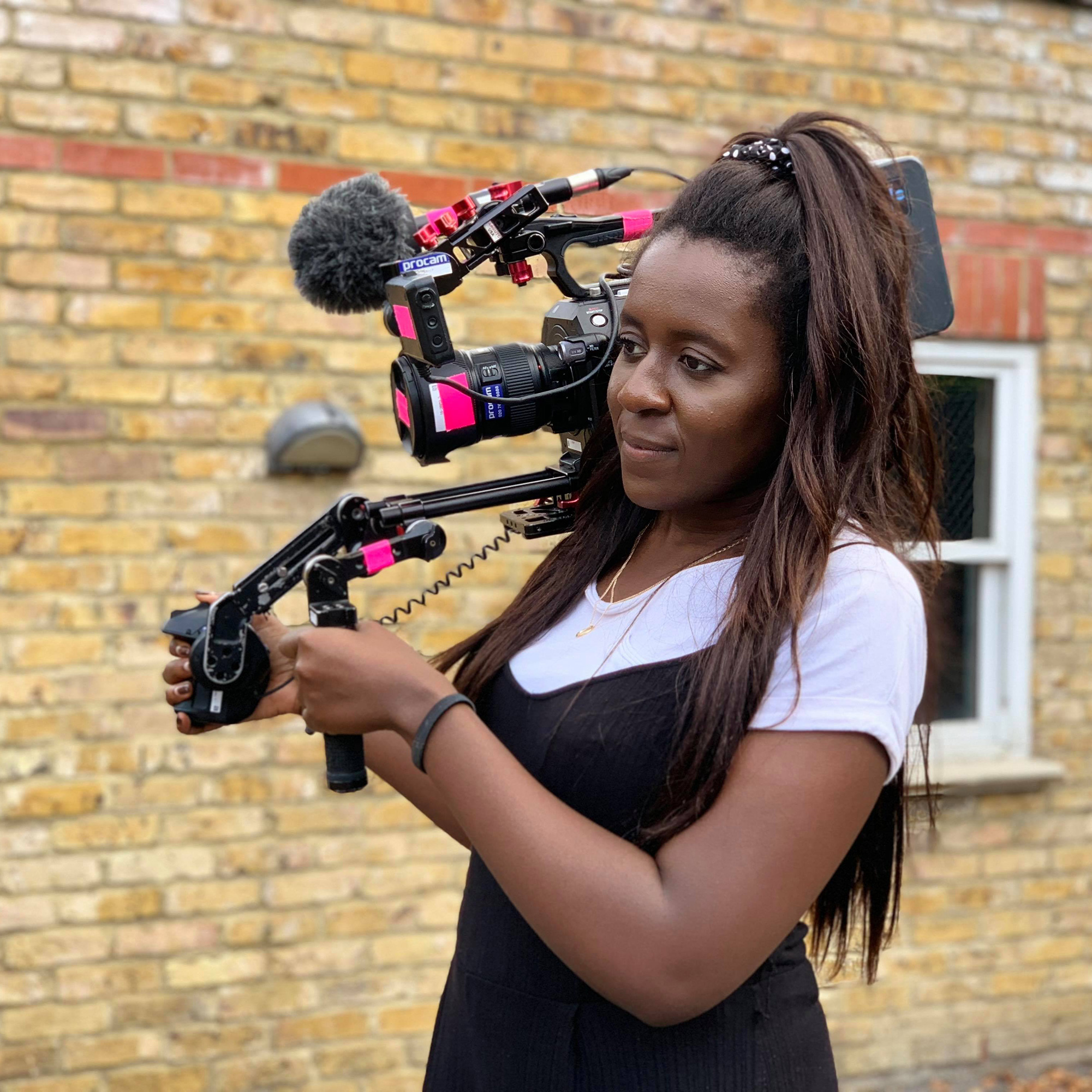
Tominiyi is a recent graduate from the University of Gloucestershire and has been working on a range of productions including with Fox International, Discovery and Netflix.
“I’m still learning and growing on every job – and it was through the help of the people that I met at university, and the opportunities I was given there, that put me in a position where I was ready to go out and start working from the second my course had ended.”
“When I first started this course, I was a little bit all over the place with where I saw myself in the TV world. In first year, I loved doing the group work in studio with everyone playing their parts to make the final product come together – but then in second year I really relished in the creative control I had from sitting with my own thoughts to create and pitch my Documentary Treatment.
“Since I’ve left university, I’ve had the opportunity to work on amazing production teams – both large-scale and extremely intimate – and ultimately, I’ve realised that job roles in the industry are adaptable and ever-changing. It’s exciting to me that at the end of one work contract, the next one I take on can be a completely different role with shooting being in a completely different country.
“I’m still learning and growing on every job – and it was through the help of the people that I met at university, and the opportunities I was given there, that put me in a position where I was ready to go out and start working from the second my course had ended.”
Production sound assistant Ben Christopher
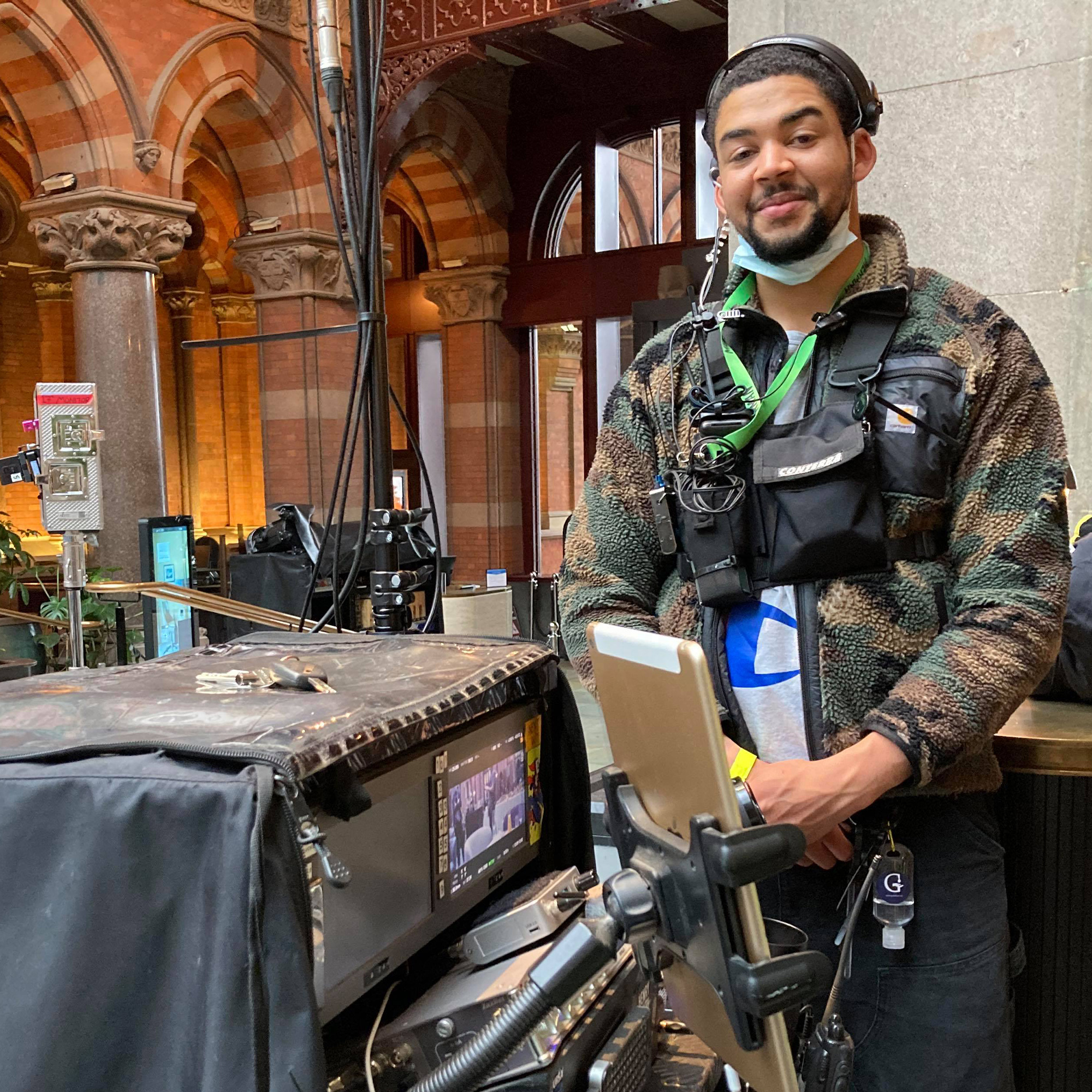
Ben has been working on a range of ITV, Netflix and BBC productions since graduating from the University of Gloucestershire with a television production degree.
“When I came on the course, I knew I wanted to work in the TV industry, but I didn’t know in what capacity. But then doing bits of post-production sound led me on to production sound recording, and that was the thing that I enjoyed most.
After graduating from our Television Production course, Ben Christopher works as a Production Sound Trainee in high-end TV drama.
“When I came on the course, I knew I wanted to work in the TV industry, but I didn’t know in what capacity. But then doing bits of post-production sound led me on to production sound recording, and that was the thing that I enjoyed most.
“The space the course gave me to experiment with different parts of TV and to try different things is what allowed me to find what I ultimately do as a job today. That’s the most invaluable part of the course – the fact they give you the opportunity to try new things, and because everyone’s learning, everyone’s in the same position.
“The facilities are amazing and the lecturers – and all of it together really does make you come out the other side of it ready for what you’re about to go into. Definitely worth doing. It’s in a way a sort of bubble of everything you need to know about the industry which I think is so beneficial to your growth – not just knowing about one thing but knowing about lots of different things, and that’s a great thing to have in your arsenal.”
Make-up artist Maia Pavord
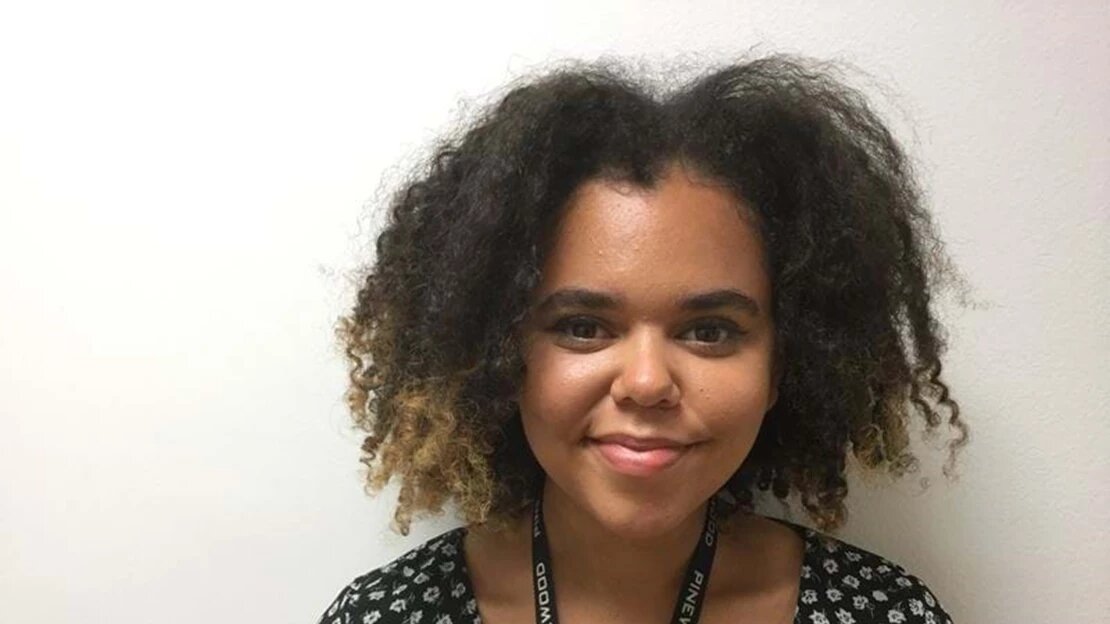
Maia gained a ScreenSkills Select endorsed advanced certificate in make-up and hair artistry which has set her on the path of successful career in this in-demand field. “I instantly fell in love with what I was doing and with the learning environment” she says.
Maia Pavord had always been a fan of films and TV shows growing up, but art education had been challenging for her as someone with a hearing impairment. It wasn’t until she received a two-day taster course at the Iver Make-Up Academy (IMA) as a gift, that she considered a career in screen. The demonstration-based nature of the ScreenSkills endorsed course proved ideal for her. “I instantly fell in love with what I was doing and with the learning environment, so I decided I wanted to join the industry,” she says.
She moved from Abergavenny to Uxbridge to pursue the IMA’s advanced certificate in make-up and hair artistry, a course endorsed by ScreenSkills Select. “The IMA has a great reputation and track record when it comes to getting their students work placements,” Maia explains her choice. “My time at the IMA has been the most mind-opening education experience I have ever had. I felt in my element around the people I met, which was something I hadn’t experienced in a very long time.”
Maia had previously started an arts foundation degree, but her hearing impairment meant she struggled to follow the lectures. As a result, she fell behind and eventually had to quit her studies. At Iver, she initially faced similar difficulties. “One of the most challenging things for me has been finding the confidence to ask for support when I need it,” she says. “I wasn’t able to watch, listen and write notes at the same time, so the academy helped me by having a note taker assist me.”
As a visual learner, the course was ideal for Maia. “Every day started with a tutorial and demonstration, so I was able to observe and understand.” In addition to the practical lessons, students also learned how to find work and about other opportunities out there that could help them get a foot in the door in the industry.
The IMA also helped students find traineeships. “Liz Tagg-Wooster, the principal, was contacted by a former Iver student who mentioned that a well-known television production was looking for a Welsh hair and make-up artist trainee,” Maia says. “She sent through my CV and put me in touch with the production, I interviewed and was given the job. I’m really happy to have found such a great job close to home.”
Owing to the Covid-19 risk, people will be wearing masks, something that poses an additional challenge for Maia. “I rely on lip reading as well as sound,” she explains. “My cochlear implant works well but I need to see people’s facial expressions. I have asked if people at my new job can wear clear masks to make communication easier for me.”
Maia is keen to start her traineeship and to show that people with a disability such as hers can work and thrive in the screen industry. “It is important not to be shy and ask for help were needed, but the most important skills to have are the ability to work hard, learn from others and be helpful.”
She is certainly willing to work hard to make her dreams come true. “It would be great to work as a make-up artist on a feature film and to eventually win a Bafta award,” she says.
FX artist Barbara Tucci

A ScreenSkills Select endorsed VFX degree from Bournemouth University gave Barbara the perfect stepping-stone into the industry.
She explains: “The fact it was a ScreenSkills Select course gave it even more credibility.”
Barbara struck gold with the ScreenSkills Select-endorsed Computer Animation Technical Arts degree course at Bournemouth University as it not only combined all her favourite subjects – maths, arts and computer science – but was also the perfect stepping-stone into the industry.
Brazil-born Barbara had made the decision while at Reading College doing a BTEC Level 3 Extended Diploma that she wanted to get into VFX and it was a lecturer there that recommended Bournemouth. “I knew the university had a great reputation for animation and my lecturer pointed out that a lot of people in the British film industry who went to university attended Bournemouth,” she explains. “Plus, the fact it was a ScreenSkills Select course gave it even more credibility.”
Having no prior knowledge or experience of computer animation and graphics before starting the course didn’t prove a hindrance for Barbara, as it taught everything from scratch.
“We were given a flavour of everything, including modelling, effects, life drawing and programming in the first year, which helped us decide which we’re most interested in and what we’d like to specialise in,” says Barbara.
She was particularly taken with a lecturer who taught compositing on Nuke software. “She gave lectures and then uploaded tutorials of what she’d taught us, so we could practise in our own time, which was very helpful.”
The first two years of the course were particularly intense with long days of classes. This was to pack everything in, but it all proved beneficial because it meant they learned all the basic skills necessary for 3D animation and visual effects. This came in handy when, in the second year, they got to make their own animation as a group, which included doing everything in the production pipeline. “Being able to work on each step really helped us understand the pipeline and how it all works. Each week we would learn and work on a different stage, with workshops, tutorial videos, and feedback sessions.”
“The lecturers were like mentors. They were very knowledgeable in their fields and they were always helpful and willing to have one-to-one’s whenever we needed help,” explains Barbara. “The course also has a number of demonstrators, who are basically staff that assist in the workshops and with any problems the students have with their work, which is vital as it's common in computer graphics for things to sometimes go wrong.”
The university also provides many opportunities for students to meet industry professionals. For example, Barbara points out that every Friday they have visitor speakers from the industry come to the university to do a talk and “that's always a good opportunity to make contacts and network”. And there's also the BFX Festival, which is a visual effects, computer games and animation festival that happens every year at Bournemouth with talks from industry professionals, masterclasses and a recruitment fair at the end. “All these events really help to network, get feedback on your showreel, make contacts etc,” she adds.
Indeed, it was a masterclass unit in which an industry professional gave a brief for the students to follow that led to Barbara getting a job straight after university. The brief was from Dionysis Bouloutzas, the FX Technical Director at DNEG.
Barbara clearly made an impression, receiving positive and useful feedback from Dionysis. When he moved from DNEG to MPC (Moving Picture Company) last summer, he put Barbara’s name forward for a junior role at the company.
“I completed my degree [with first-class honours] and they contacted me offering an interview. It went well and I was offered the job as an FX artist,” says Barbara. “I now create photo-realistic effects, such as fire, explosions, water and destruction on TV series for the likes of Amazon Prime, BBC and Netflix.”
Barbara is extremely grateful for everything she learned on the course, especially the fact that it taught her the technical skills required, “I’ve always been more of a technical person than an artistic one, but I always liked a middle ground between the two and this course specifically offered that,” she says. “The technical units I did, such as maths and programming, have been really beneficial to me as I use those skills on a daily basis at my job as an FX artist. Not all animation jobs require technical skills, but having basic coding skills is a nice extra selling point”
Barbara also points to the importance of ScreenSkills, not only with its stamp of approval for the course, but because she found the job role section on its site really useful. “When I was looking for what I wanted to do and see what was available, that section was vital because it explained what was required for each role and what a person needs to be good at, which really helped me,” concludes Barbara, who is growing in confidence in her new role, learning from her experienced colleagues.
Camera trainee Caleb Johnston
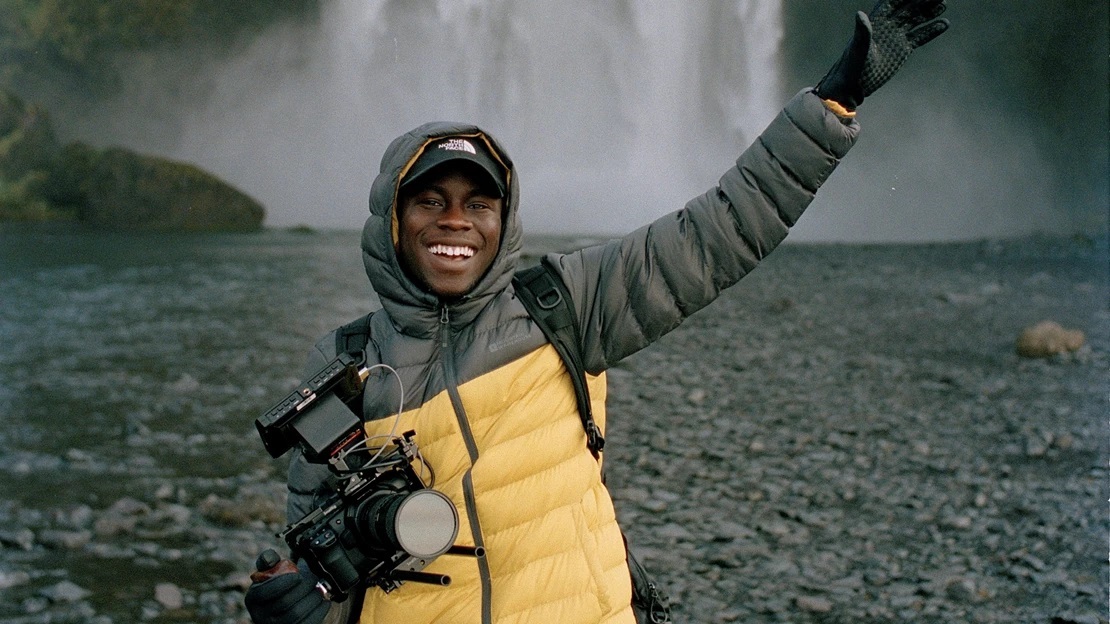
Camera trainee Caleb Johnston believes his ScreenSkills Select endorsed degree will help him reach his goal of working as a cinematographer on short films and commercials.
Caleb Johnston always had a passion for cameras and dreamt of a career as a cinematographer. He took a first step towards turning that dream into reality by taking the BA Film Production, a ScreenSkills Select endorsed degree at the University of Portsmouth.
“I applied for a ScreenSkills Select degree because I trusted the course to keep up with the ever-changing pace with which the film industry changes,” he says. “Because equipment improves rapidly it was important to me to choose a course that’s up-to-date with current industry standards. I trusted that a ScreenSkills Select degree would offer me this and more.”
Given his passion for all things camera, being in an environment full of the latest equipment was great. “We were able to borrow pieces of equipment whenever we wanted so we could learn how to use them in our own time and at our own pace,” he explains. “If I ever didn’t understand how to use something I could ask and the patient people from the loan store were always happy to explain.”
The university also encouraged students to attend industry events to build a network. Caleb went to various events in an attempt to get a foot in the door. Eventually that enabled him to get in touch with Barry Basett, the managing director of VMI rental house. “Had Covid-19 not had its own plans for 2020, I’d currently be working at VMI as an intern,” he says. “Due to the pandemic the internship has been delayed, but I’m very excited to work there in the near future.”
Until then he is working as a freelance camera trainee on commercials and music videos. He has found out that being a camera trainee is a good next step in his journey towards becoming a cinematographer. “There is so much to learn and I really want to nail the fundamentals before progressing,” he says. “As a camera trainee, I’m able to learn about equipment and set etiquette, and I can also see how great cinematographers approach shooting different scenarios.”
One of the things he has enjoyed most so far whilst working as a trainee is meeting interesting people. “The film industry is full of such fun characters,” Caleb says. “I’ve been on a set where the talent was sharing their really inspiring life story. I was honoured to be a fly on the wall and hear the story in person…. I have taken home some gems that I’ll forever hold close to my heart.”
He has also discovered that camera trainees can be given quite a lot of responsibility. “I think a misconception many people have is that camera trainees don’t need any technical abilities, but the more on point you are, the more tasks the 2nd AC can give you.”
Caleb hopes that hard work and a positive, cheerful attitude will help him reach his goal of working as a cinematographer on short films and commercials within the next five years. He also hopes to one day work on feature films. “I can say with confidence that I obtained my degree at a reputable institution,” he says. “And I’m always keeping my eyes open for new opportunities. You’d be surprised at how many people in your social circle know camera assistants, producers or directors that they can connect you with.”
His tip for others wanting to get into the industry is to use social media for networking too. “Message camera assistants and directors of photography to let them know you are available to give them a helping hand at their next shoot,” he advises. “And never stop shooting your own stuff, that way people will be able to see that there’s a real passion and intentionality behind your requests.”
3D motion designer Dominic Spall
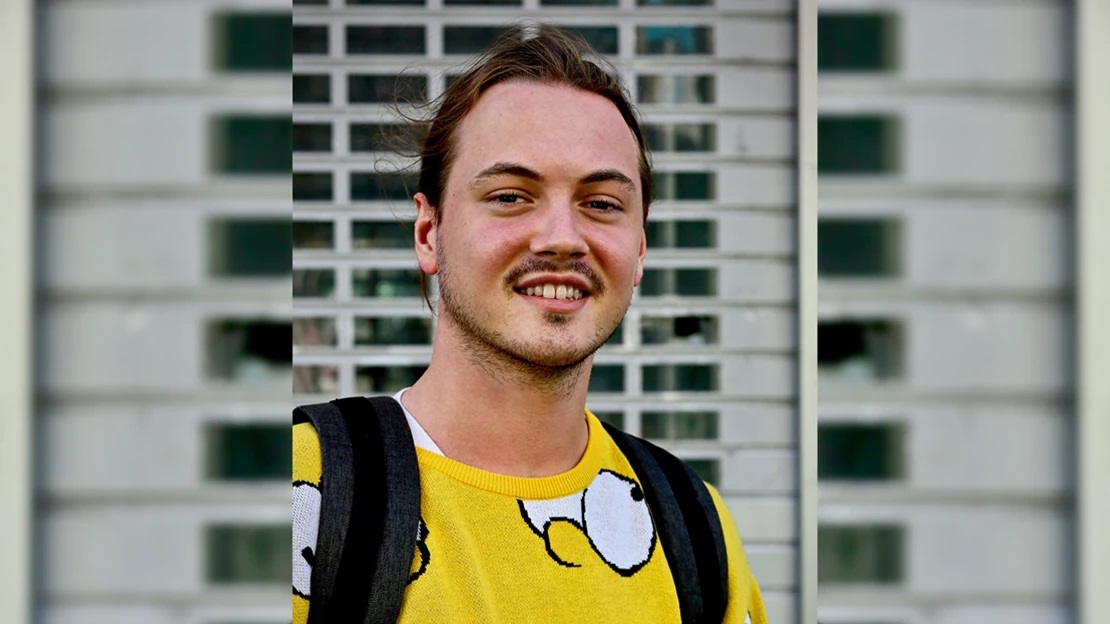
Dominic gained a ScreenSkills Select endorsed degree in animation at Edge Hill University and now combines a freelance career as a 3D motion designer with a job as creative designer.
Dominic Spall, born and based in Chester, always knew he wanted to work as a 3D motion designer. A ScreenSkills Select endorsed degree in animation at Edge Hill University seemed a good step towards realising that ambition.
“I applied for the animation course because it seemed like the modules covered a broad range of things relevant to animation, from practical workloads to the history of animation and animation in the cinema,” he says.
The combination of theoretical and practical work offered as part of the degree proved perfect for Dominic. “The course was a good experience,” he says. “I gained a lot of valuable information and got a good insight into the inner workings of the industry.”
During his time on the course, he had access to a great deal of good opportunities. “I contributed to an art installation that was on display in the Tate Liverpool and worked on an animation for a film festival in Portugal with students from the University of Lisbon.”
Now graduated, Dominic combines a freelance career as 3D motion designer with a job as creative designer. While he admits that his job can at times be quite stressful - especially when working to a tight deadline - he also enjoys the rush that comes with that. “I’m very lucky to love most aspects of my job. I find the problem-solving aspect of doing 3D work very enjoyable.”
Since leaving university he's worked on a variety of projects, including music videos and an advertising campaign featuring a 3D animated snake for BBC iPlayer’s Endless Attenborough boxset. He also found out first-hand how sharing work online can really get your name out there, when a project he created for fun was picked up by YouTuber Pewdiepie. “As a designer your portfolio is everything,” he says. “Sharing it online on platforms such as Instagram and Artstation is the way to get recognition and clients.”
He also recommends people with an interest in animation to find out which specific part of field appeals to them. “Find out what path you want go down, 3D, 2D or stop motion,” he advises. “It can help to look up other artists on social media to see what they are making. And get involved in Facebook groups so you can ask questions and share your work. It’s a great way of learning.”
Series researcher Greg Wycislok
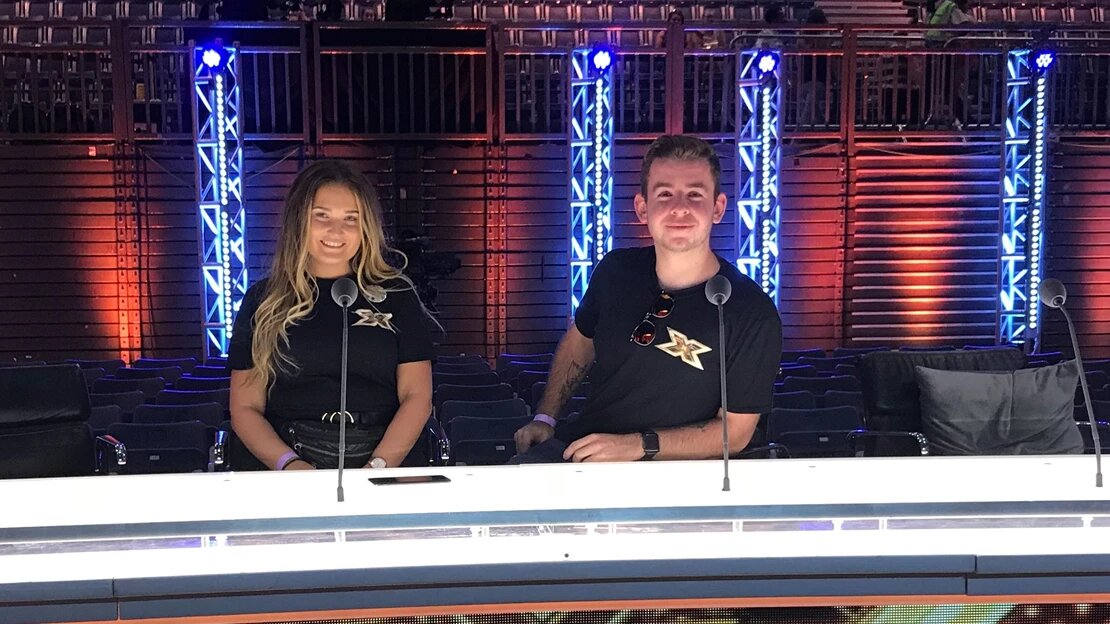
A ScreenSkills endorsed degree in TV production gave Greg the valuable skills he needed to work in TV as a series researcher.
He enrolled in the ScreenSkills-endorsed TV production degree at Solent University in Southampton. “It was a great place to start.”
Greg Wycislok dreamt of working in the TV industry. He enrolled in the ScreenSkills-endorsed TV production degree at Solent University in Southampton. “It was a great place to start.”
Greg always wanted to work in TV, in the editorial department. “I wanted to work on the creative side of things. Not in production,” he says. “Ultimately it’s my dream to produce my own prime-time show and when I did some research I found that the best way of getting there is to enter the industry by working as a runner whilst studying, then move up to being a researcher and slowly work your way up to becoming producer.”
The first step towards realising his dream was picking a degree that would enable him to get a foot in the door. “I looked for degrees that would prepare me for the real industry. Because the degree I applied for was endorsed by ScreenSkills I knew that it’s content had been properly assessed.”
The TV production degree enabled him to explore many of the facets of TV production, including topics he knew he likely wouldn’t work with directly, such as software programmes and film equipment. “Although I never planned to work as a camera operator, it’s a great to have the skill to know how to operate cameras and other equipment. Many production companies are looking for multi-skilled people that can shoot and edit. The course gave me a really good foundation to build from.”
Whilst studying he started looking for opportunities as a runner on shows like Strictly Come Dancing and Big Brother. “There are many misconceptions about the role of runner. People think you are just running around making teas and coffees. In reality, you have way more responsibility than that. You may for example assist celebrities that appear in shows.”
After graduation and various runner jobs, Greg was able to move up to the role of series researcher. “I like how diverse the job is. You could be involved in the casting process and location scouting,” he says. “In my current job at 24 Hours in A&E I work as a researcher for the liaison team, making sure that everyone that took part in the documentary consents to be featured and has completed all relevant release forms.”
Greg has experienced that having other skills, including the ability to drive and speak different languages including his mother tongue Polish, have helped him grow in the industry. “Having a driving licence and first aid skills for example, will help you get your CV on top of the pile,” he explains. “A thing that also helped me a lot was a job in retail, because many skills gained there can be transferred into the television industry.”
The combination of studying and working for big shows has enabled Greg to develop a network and real work experience, while building a solid base of knowledge. “The TV industry isn’t for people that are afraid to step out of their comfort zone,” he says. “If you can, go to university as they offer a lot of training that can prepare you for the industry. And then, once you have entered the industry, nothing is more exciting then to see you show on television, especially when your name appears at the end.”
Digital imaging technician Christy Kail
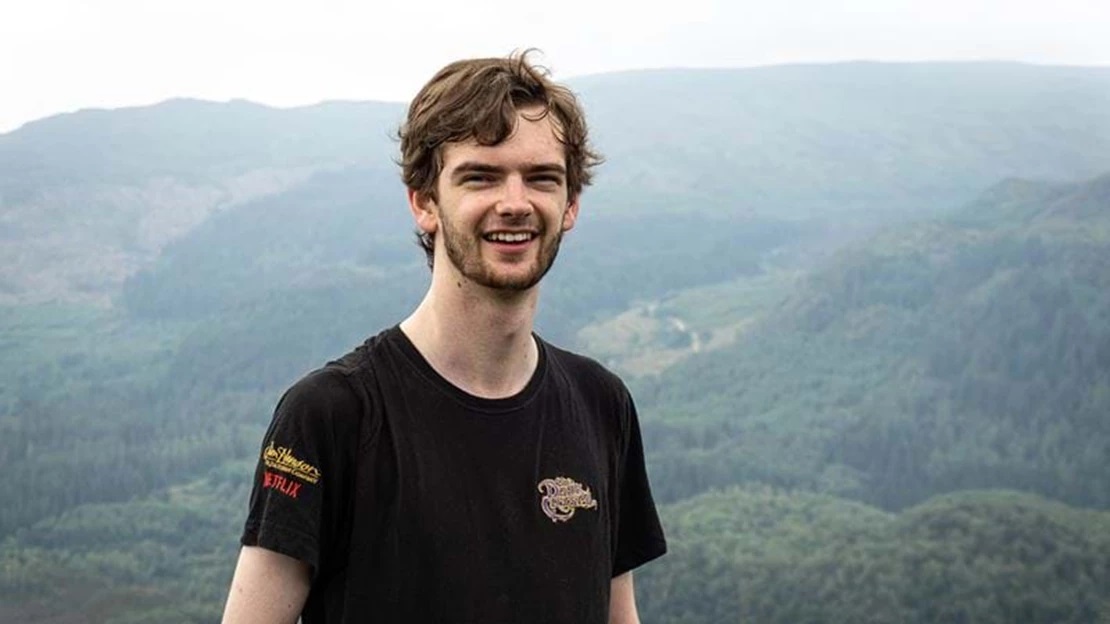
Christy found his direction within the industry and became a DIT only 18 months after taking a ScreenSkills endorsed course.
“I wanted to make sure that the course I picked was approved by an organisation that understands the current requirements of the industry".
Christy Kail applied for HND Digital Film and Television, a ScreenSkills-endorsed course at Glasgow Clyde College, because he wanted explore which part of film making he enjoyed most. He also wanted to make sure that what he learned was relevant from an industry point of view.
“I wanted to make sure that the course I picked was approved by an organisation that understands the current requirements of the industry,” he says. “I had already taken a course in a different field that I didn’t think was really fit for purpose.”
Whilst studying his interest shifted more and more from the technical sides of filmmaking to the workflow and managerial aspects of the process. “I was constantly fixing workflows for my classmates.” After realising he enjoyed that as much working on set, he decided to pursue a career as digital imaging technician (DIT) to combine the two.
During his time at college, Christy took on dailies jobs to gain work experience and get a better grasp of what each job on set entails. “Every course is only as good as you make it,” he says. “All courses give you the basics of specific job roles, but you really need to use the tools the course gives you to develop your skills on set as well.”
His course placed a lot of emphasis on helping students prepare for work in the industry after graduation. “We were assisted by the college when contacting productions for work experience and we were encouraged to build an industry network. I actually consider that support the most valuable part of the course.”
It enabled Christy to work on a number of short films before he started working as a freelancer for a digital imaging service – first as a dailies lab operator and then as a DIT. “I pursued every opportunity that presented itself as a student, because I wanted to learn about everything,” he says. “It’s crucial, especially when working as a DIT, to have a good grasp of all the jobs on set. The experience I gained through the years helps me understand what might be required of me from an editorial point of view when the workflow changes in different departments.”
When he left college, Christy thought that he might be working as a DIT in five years’ time. Approximately 18 months later he already finds himself in that job role. “Things are moving so incredibly quickly for me at the moment that it’s difficult to predict where I’ll actually be five years after graduation,” he says.
Documentary director Inma de Reyes

Inma developed her transferable theatrical skills using a ScreenSkills endorsed MA in film directing to become a documentary director.
The degree - which focuses on documentary making - was intense and had a very practical focus. “
After graduating from a film course, Inma de Reyes went on to direct in theatre. Although she enjoyed her job, she knew that she wasn’t in the right place. “I had moved from studying film to theatre because that felt more real. But when I started watching documentaries something suddenly clicked,” she says. “I found the form of storytelling I had been looking for all along.”
As she was exploring ways to transition from theatre to documentary making, a friend recommended she apply for the ScreenSkills-endorsed MA Film Directing at the Edinburgh College of Art. “Initially, I was rejected because I hadn’t produced any documentaries yet,” Inma says. “But I was able to prove that I had the right transferable skills and a solid background in theatre, so they decided to give me a chance after all.”
The degree - which focuses on documentary making - was intense and had a very practical focus. “We spent a lot of time on making our own films,” Inma says. She valued that all students were encouraged to find their individual voice and style as opposed to making the students follow a format. “Course leaders Emma Davie and Noe Mendelle were really involved. They worked as our producers and did everything they could to help us explore our own styles. There we no restrictions to what we could do, which I really loved.”
In addition to helping her develop the practical skills of filmmaking, the course also enabled Inma to connect with industry professionals. “People with real industry experience would regularly come in to talk to us about all the aspects of the filmmaking process - about the different behind-the-camera jobs involved but also about things such as pitching to festivals.”
Inma felt that hearing from people who had walked the same path helped her understand which steps she needed to take to become a director. “It was a great way to build a network as well,” she says. “At the moment I work with one of the producers that visited our degree. We kept in touch afterwards and are now developing a feature together.”
The university also encouraged students to work with peers from other courses to widen their network. “I worked a lot with a student from another course. That was a great way to learn how to collaborate on projects and in fact, we are now developing a feature together.”
The importance of developing a network was seen when Inma successfully premiered her graduation film To Be a Torero at Sheffield Doc/Fest. She met two producers beforehand and invited them to the screening. They were so impressed that they offered to co-produce her feature-length documentary El Niño y El Traje de Luces (translation: The Boy and the Suit of Lights). The project, a co-production between the UK, USA and Spain, has since been pitched to Docs Barcelona and Edinburgh Pitch.
“When I started my degree, I couldn’t have dreamt of directing my own films this quickly,” Inma says. “It’s challenging to create your own films. You spend a lot of time thinking about the project and it can be difficult to make a living. But there are so many opportunities in Scotland and I love the community of filmmakers that I am a part of here.”
Spanish-born Inma hopes she will still make films in five years’ time, reaching bigger audiences and perhaps having a film shown in a cinema or at a big festival. “I’d love to stay in Scotland, there is such a big support network here for documentary makers, making it easy to work here.”
3D games artist Shay Palmer
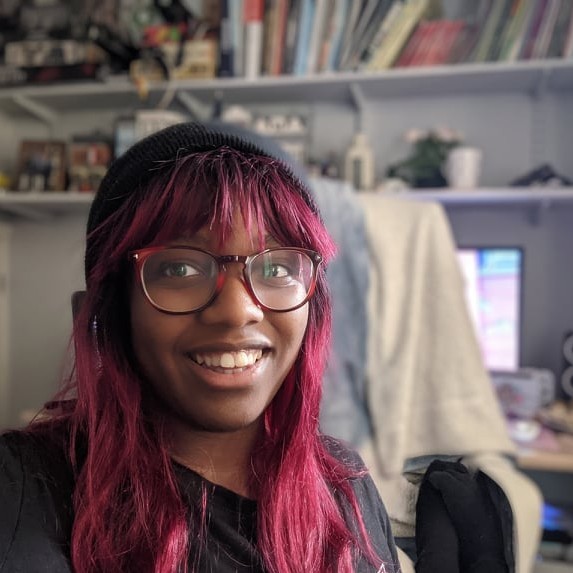
Shay is combining her final year Games Art degree studies at De Montfort University with her placement as a game artist with Criterion Games.
Shay from Croydon points to her mother’s wise career advice on why she studied on De Montfort University’s (DMU) Game Art degree course before successfully finding a game artist placement at Criterion Games in Guildford. She is combining this with her final year studies.
Shay is combining her final year Games Art degree studies at De Montfort University with her placement as a game artist with Criterion Games.
Shay from Croydon points to her mother’s wise career advice on why she studied on De Montfort University’s (DMU) Game Art degree course before successfully finding a game artist placement at Criterion Games in Guildford. She is combining this with her final year studies.
When she was in her mid-teens, Shay was living in the Middle East and at that time she started to think about her future. She was always into music and games and her computer scientist mother suggested it was vital to find a role that paid a regular salary within a field she was talented in. Her mother suggested games art and games development as a career.
When she moved back to the UK to finish her A Levels, she turned her head to university and it was the fact that DMU had such strong industry links and a great alumni that really persuaded her this was the best place to study. She was confident studying game art there would lead to a job so long as you applied yourself, met as many industry people as possible and were fully committed to learning.
Shay had already seen the strength of DMU’s alumni for herself because “when I was looking for a university, I kept bumping into DMU alumni at conventions including Comic Con. They are everywhere and all are doing well. So I thought this is the place to go because you get jobs in the industry if you do. ”
She was also keen to take leadership roles which she felt would also strengthen her opportunities and experience. She said: “I liked Leicester. Everywhere is in walking distance and I lived next to the studio and became the student representative on the course.”
On the degree course itself, she said: “What was important about the course was that it was founded in the tradition of art and then translate the core principles to 3D art and modelling. It meant that you learnt how to create art that was engaging, based on the human psyche and emotional. This I felt has been important for me to understand to translate these fundamental universal principles to a gaming environment.”
She reflected on the fact that the course was endorsed by ScreenSkills Select and this also made a difference as it “made the course even more enticing especially comparing it against those who were not accredited”
With respect to actually finding a role, she recounted how she applied for a placement at Criterion Games. She was clear about the need to be confident in applying so “I threw my name in the ring and was lucky to get a place. It helped that I had been involved in a lot of games competitions, was active in the games development society and also had the student rep role. It helped me stand out.”
Her advice to students thinking about what course to take is also clear. “Go to conventions, see where people studied and ask them about what are the best courses and where they recruit from. Once on the course, it is vital to network with as many people as possible, build your teamwork skills and collaborate. People are more likely to hire you if you get along with people. Some students I know have immaculate portfolios but because I am personable, I feel it enabled me to get the role at Criterion Games.“
Shay’s experience in being fully committed to learning, collaborating and also working out how you can stand out from the crowd has certainly borne fruit. If there was a template for how to get a role in the screen industries, this is it.
Junior technical and production engineer Rachel Jones

Rachel Jones knew nothing about broadcast engineering before attending an open day at Cardiff Metropolitan University. Rachel initially interviewed for a journalism course at the university, but after meeting with the programme leader for the MSc Sport Broadcast course and viewing the equipment available, atmosphere, industry contacts and guest speakers Rachel knew the MSc in Sport Broadcast was the right choice.
"When I got into the course, I was taught the nitty gritty stuff of setting all the equipment up, running all the cables, doing everything that isn't the glamorous aspect of broadcast. I'm not an in front of camera person, I hate speaking live on screen, I don't like the sound of my voice, I don't like seeing myself on a TV screen. So being able to work behind the camera was ideal for me.”
Since graduating from MSc Sport Broadcast, Rachel initially became a freelance vision mixer before Covid hit. Rachel then took a fulltime position as a videographer but discovered she was more interested in the organisation required behind the camera. She is now a Junior Technical and Production Engineer at Matchroom Media, a London based production company (with an office in Bristol), combining cutting edge technology, and industry-standard live productions. Her role is to make sure ‘everything works’ “I take charge of all the darts streaming events, men's, women's and then some live shows as well.”
Rachel explains that trouble shooting is the main aspect of her job. Her role is broad and Rachel is always learning new skills and the technology is always advancing. Since joining Matchroom, one of the projects Rachel is most proud of is leading the production of a women’s darts event in 2022 which was livestreamed back in June of last year. Rachel ensured that the majority of staff on the production team were female.
“I worked on a project last year where we produced the women's series of darts, which doesn't normally get much coverage at all. I created a majority female production team, for one event, we had our first ever female commentator, myself as engineer, and then I had two female directors, which was the best accomplishment I think I had last year, and it got a lot of publicity.”
Although there’s a current shortage of women in broadcast engineering Rachel hopes things are changing slowly - “I don't think the publicity is out there that women can actually do this job. I never envisioned myself engineering in any way, shape, or form. I thought it was a scientific, technical thing, which I was never into at school, I was far more practical and creative.” “I think there needs to be that one, or two people, out there highlighting that it's not a male only industry, there's a lot of us out there - sound engineering, video engineering, we just need to show we are there. It's not a men's world.”
Whilst on the MSc Sport Broadcast course at Cardiff Metropolitan University Rachel had the opportunity to experience live briefs with every project being different. Rachel recalls - “The course was so practical - I had a radio masterclass from Phil Steele, a producing masterclass from Jason Muhammad.” – “And it's a case that everyone works together, I've brought in students from the course to work with us at Matchroom, starting with work experience which can progress into full time roles, it's a course that helps one another. I think that it’s been consistent over the years, and we've now got four generations of Cardiff Metropolitan University employees at Matchroom, both as fulltime staff and freelancers.”
Rachel’s top tips for students thinking of embarking on a sports broadcast course are – “Try everything you can. Don't go into a course being narrow minded, set on being the social media manager of a sports team, or presenter for this sport, if you’re doing that you're going in close minded, you're not going to enjoy anything else. And if it doesn't go your way, you're going to be so much more disappointed in yourself than anything. So be open minded, try everything, direct streams, commentate. I did commentary, I didn’t enjoy it that much but then I directed a livestream and absolutely fell in love with it, I produced a radio show and fell in love with it, I worked with cameras, which I never thought I would do. Trying it all makes you realise how varied the industry is.”
“Make contacts consistently because they will benefit you in the future. I was told to have a little address book, and everyone you meet to get their email or phone number, note their name down the company they work for.”
“And just enjoy it. It's a large industry, with a small community, you'll meet so many interesting people out there. I've met so many of my closest friends through my job. Just remember, you don’t need to know everything, don’t put too much pressure on yourself.”
So what’s next for Rachel?
In terms of the future, Rachel feels there’s so much still to learn in her current role, for example ensuring production is of a broadcast standard, but she is keen to take opportunities when they come up. Next steps for career progression at Matchroom would be to train junior staff to take her position and to lead on broadcast production and overseeing streaming.

